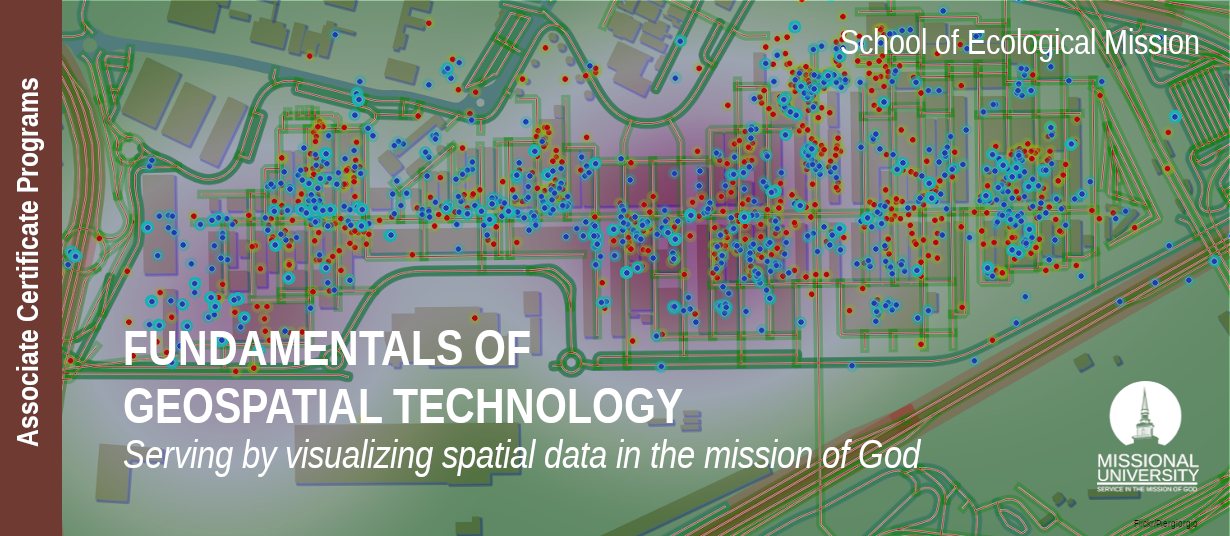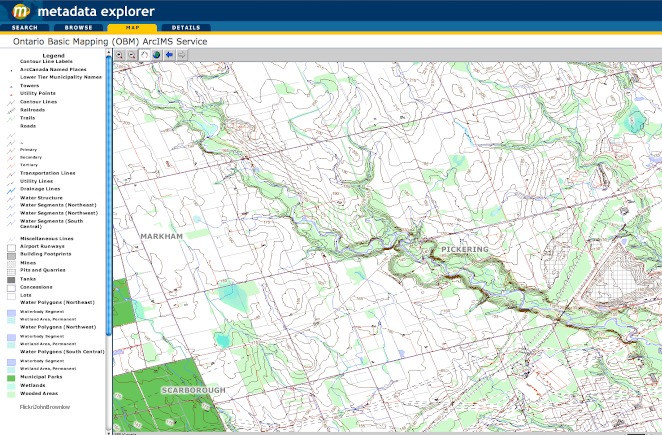
Online Associate Certificate in
Fundamentals of Geospatial Technology
♰ Similar to Other Universities, But with a Unique Set of Courses
Expand Your Missional Service Today!
REQUEST INFORMATION
Ready to learn more about the
Associate Certificate in
Fundamentals of Geospatial Technology?
LEARN MORE NOW
The Associates Certificate in Fundamentals of Geospatial Technology is an introduction to the study of geography as it intersects with geology, demography and public health. Students taking this certificate will discover how geography intersects with the environment and human development, as well as learn how to visualize data by mapping various characteristics. Through the use of geospatial techniques, students gain a broader understanding of God’s mission in the world and how we position ourselves to participate in that mission.
Program Features
-
Integrated practicums allow you to gain valuable real-world experience
-
Learn from academic practitioners from around the world
-
Credits earned in this certificate program can apply to a Missional University Associate degree program
Course Effort
Course Length
Credits Required
Program Cost
What Will I Study?
We offer the most comprehensive approach to visualizing spatial data in the mission of God.
A survey of Missio Dei, the Mission of God, explores Salvation History through the redemptive vision of God. The student will learn how God is reconciling all of creation unto himself in the person and work of Jesus Christ. Students will also observe God at work through His people in mission.
This course explores the spiritual dimension of missional engagement in the post-Christendom world. Students will discover practical and creative ways of deepening their personal spirituality allowing more engagement with not-yet Christians and the development of authentic missional community. Resources will include readings, video interviews with practitioners, creative spiritual practices, real-life experimentation and weekly Q & A reports.
This course consists of an extensive examination of physical and cultural factors that contribute to the variable character of the Earth’s surface, discussion of the significance of geographic concepts, and knowledge of world affairs. It includes investigation of the factors related to human geography including: populations, cultures, economies, political systems, etc. In addition, we will cover basic geographic skills and concepts such as scale, region, location, and other spatial concepts applied to these factors.
Introduces geospatial technologies and methods including Geographic Information Systems (GIS), cartography, remote sensing, and spatial analysis with an emphasis on their use for defining and understanding ministry environments in context of geography.
Provides a basic understanding of geospatial software packages, specifically Geographic Information Systems (GIS), used to capture, store, manipulate, analyze, manage, and present spatial or geographical data. An emphasis is placed on the use of free and open source software (FOSS) systems and their applications for missional ministry.
This course is an introduction to the Global Navigation Satellite Systems (GNSS) and its application in geosciences. It will deal with the history, development, drawbacks and advantages of the GNSS. The mechanics of satellite constellation, datums coordinate systems, point versus differential positioning will be discussed as well. Special emphasis will be placed on the use of GNSS data to investigate geohazards, crustal deformation, post- seismic deformation, volcano deformation and plate tectonic motion.
When Can I Get Started?
We offer multiple start dates each year to give you flexibility in your education, life and work schedules.
JANUARY
MARCH
MAY
AUGUST
OCTOBER
A Career in Transforming Communities
Is this Your Mission?
GIS Missionary, Geospatial Analyst, Geospatial Intelligence Analyst, Geospatial Production Analyst, Missional Cartographer, GIS Consultant, GIS Coordinator, GIS Developer, GIS Project Manager, GIS Spatial Analyst, Mapping Consultant, Mapping Coordinator, Mapping Project Manager
Request Information Now
How Much Will it Cost?
We offer tuition based upon country of residence. According to the Human Development Index, all countries around the world fall into one of four categories:
-
(Tier 1) - Very High Human Development
-
(Tier 2) High Human Development
-
(Tier 3) Medium Human Development
-
(Tier 4) Low Human Development
Our tiered global tuition makes higher education affordable for everyone world wide.

TIER COUNTRIES
100% Tuition
$295
per credit hour
3 credit course
$885

TIER COUNTRIES
80% Tuition
$236
per credit hour
3 credit course
$708

TIER COUNTRIES
60% Tuition
$177
per credit hour
3 credit course
$531

TIER COUNTRIES
40% Tuition
$118
per credit hour
3 credit course
$354
Tiered tuition based on country of origin and scholarships available. Find your country of residence here for more information.
Tuition may be further reduced by participating in the Sponsorship Program.
